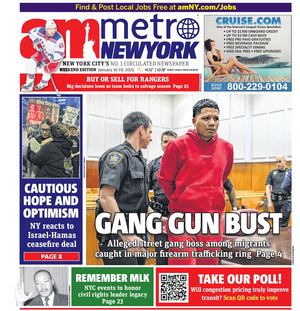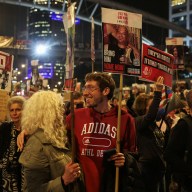BY PAUL SCHINDLER
Bob Kohler, a tireless advocate for civil rights, peace, gay liberation and dignity for everyone from mid-20th century black actors to people with AIDS and homeless queer kids, died in the Charles St. apartment where he resided for 45 years on Dec. 5.
Kohler, who was born in Queens on May 17, 1926, was 81. The cause of death was lung cancer that was diagnosed in October.
“Bob was a complete Greenwich Village original. He was the Village,” recalled Christine Quinn, the openly lesbian speaker of the New York City Council. Quinn, who knew Kohler for the past 15 years, said she “was lucky enough to have had a conversation with him” the week before his death.
Quinn added, “He was a total character in the best sense of that word. At times he was gruff and rough around the edges in a New York kind of way, but he was also one of the kindest people you could find. He cared about people who were less fortunate than himself in a very, very profound way.”
Jennifer Flynn, former executive director of the New York City AIDS Housing Network, was among a group of mostly young lesbian activists who dubbed themselves “Bob’s Queers” for the strength of their friendship with him and their care for him in his final days. Flynn recalled Kohler’s unflagging work to ensure that the city, in the last several years of Rudy Giuliani’s mayoralty, lived up to its obligations to provide housing, on a same-day emergency basis, if necessary, to homeless people living with AIDS.
NYCAHN had issued an action alert looking for people willing to stand outside the offices of what was then called the Division of AIDS Services and Income Support to offer help to any homeless person with AIDS turned away at the end of the day. Initially drawing crowds of up to 30 activists who stood silent vigil, Kohler proved to be the most committed of the lot.
For nearly two years, he turned up every single day — except for four days when he was dealing with gum surgery — until housing advocates finally won a court order finding the city in contempt and ordering that it redouble its emergency housing efforts.
“In five years after that, I only received one call from someone with AIDS, in Brooklyn, who had been denied shelter,” Flynn said, a tribute, from her vantage point, to the efficacy of Kohler’s work.
A Navy veteran, he saw action and “left a kidney behind” in the South Pacific, according to an 80th birthday tribute written by activist and close friend Emmaia Gelman. Kohler spent the immediate postwar years working in television, before starting his own talent agency in Hell’s Kitchen. He was a pioneer in representing non-big name African-American actors during a time when their career prospects remained sketchy.
In time, Kohler joined CORE, the Congress of Racial Equality, a civil rights group dating to the 1940s that was a leader in direct action strategies including the Freedom Rides of the early 1960s. Many of those who joined the Freedom Rides faced arrest. Whether or not Kohler was jailed then, during his many years of activism he was arrested 32 times, according to a 2006 profile in The Villager.
By the late ’60s, he was also involved in the antiwar movement opposing U.S. intervention in Vietnam. A moment of even greater significance in that period of his life, however, came late on a warm June evening in 1969 when he was walking his dog down Christopher St. and came upon a crowd of roughly 400 people screaming in rage at police who were trying to forcibly shut down the Stonewall Inn.
“It was ugly,” Kohler recalled in a June 2007 New York Times article. But he stayed to cheer on the crowd. He would soon join the radical Gay Liberation Front, a prime mover in the activism that followed Stonewall in the early 1970s.
“The G.L.F. — we did some pretty ballsy things,” he told The Villager last year. “We were very fierce and we were very angry and we didn’t take any shit from anybody.”
But it was not Stonewall that brought Kohler out of the closet. Gelman’s 2006 tribute noted that Kohler would often regale his younger friends with stories from the 1950s and ’60s about Kohler and his boyfriend Ed buying a fixer-upper in Amagansett in Long Island’s east end, years before it became a gay enclave.
“We were gay when it wasn’t cool to be gay, and I like to think that we did make a few openings here and there,” Gelman recalled Kohler telling her. “We never closeted ourselves.”
By the late 1970s, Kohler had become manager of the Club Baths, and when the AIDS epidemic hit several years later, he forcefully opposed efforts to shut the city’s many bathhouses, arguing that they were safe places providing soap, water and condoms.
“Many bathhouses were willing to take on a community organizing role to stop the spread of AIDS,” he would later say.
As AIDS activism surged in the 1980s, Kohler got involved with ACT UP, and a decade later with Sex Panic!
In the early 1980s, Kohler began work that would give him his highest public profile, opening The Loft, a clothing store on Christopher St. that sold fashionable T-shirts, among a variety of hip, often sexy “queerwear.”
Kohler was proud of the fact that he rubbed Calvin Klein’s nose in it by pulling the designer’s underwear from his store after repeated misogynistic comments from the company’s model Marky Mark.
“This is a gay store,” a sign in the window read. “Straight are welcome if they behave. Please sue me.”
In an interview with Gay City News’s Andy Humm for the 2008 Village Care of New York calendar, Kohler bragged, “Gay kids came into the store and pretended to be shopping just to be in a safe haven.”
It was that spirit that, in time, would make him an outspoken defender of the street youth, who during the 1990s increasingly became the target of community ire in the gentrifying West Village. In the past decade, Kohler became an active supporter of and mentor to FIERCE!, the Fabulous Independent Educated Radicals for Community Empowerment!, a group of young activists representing the interests and rights of queer youth in the Village.
“The more need you had, the more complicated the set of problems you had, the more he wanted to help you,” Quinn observed of Kohler.
For Flynn, that tendency of Kohler’s to involve himself in the lives of others and reach out across generational divides not so often breached in the queer community offered her and other younger activists a unique gift.
“For a group of radical queers, he was somewhat of a grandfather,” Flynn recalled. “It was so incredibly important to have someone of a different generation, several generations older than us, who was out, who had radical politics, who never caved on his beliefs, who took action. For us, it seems like it’s something only young people do. Radical politics is our lives, activism is our lives — and it was so important to have him.”
Flynn noted that Kohler gave up more conventional pursuits to live the life he did.
“There’s no glory in loving sex-working prostitutes, whores and fags,” she said. “He didn’t have to. He was hot, sexy, he could have been well-off, and I think he once was well-off. But he talked to crazy activists who had chaotic lives. … He was totally a fascinating guy.”
David Carter, whose 2004 “Stonewall: The Riots That Sparked the Gay Revolution” is the definitive account of the 1969 uprising, said, “I just think that Bob occupies a rare and special place in our history. I will always remember Bob for his passion for gay street youth — after everybody had forgotten them — the ones who started the riots.”
Carter added, “He was a person with a lot of character, but was very much his own man. He was such a part of the Village for such a long time.”
And, to many, Kohler’s legacy in that neighborhood ranks right up there with his role in the queer community.
“In Greenwich Village, Bob Kohler was the equivalent of our Harvey Milk,” said Melissa Sklarz, a longtime transgender advocate. “He was an activist in the ’60s, he was an activist in the ’70s, he was an activist in the 21st century.”
Friends of Kohler held a “political funeral” on Sun., Dec. 9. Mourners gathered at the L.G.B.T. Community Center at 208 W. 13th St. at 4 p.m., then marched to Christopher St. and the Christopher St. Pier, where they poured his ashes into the Hudson. They demanded space for gays and gay youth of color in the West Village; a cure for AIDS and HASA for All, a city housing entitlement not only for those living with AIDS, but all those who are H.I.V.-positive; and respect for “the crazies” — who, as Kohler liked to point out, “are the ones who usually lead the way.”
For information on plans for a more formal memorial service for Bob Kohler later, e-mail bobsqueers@gmail.com.

































